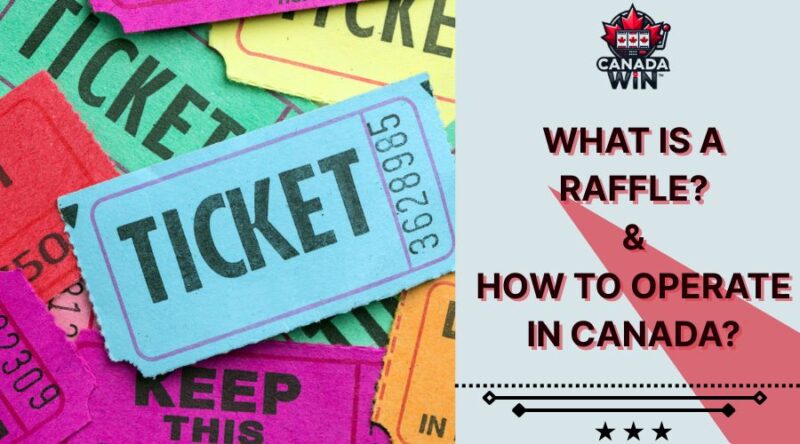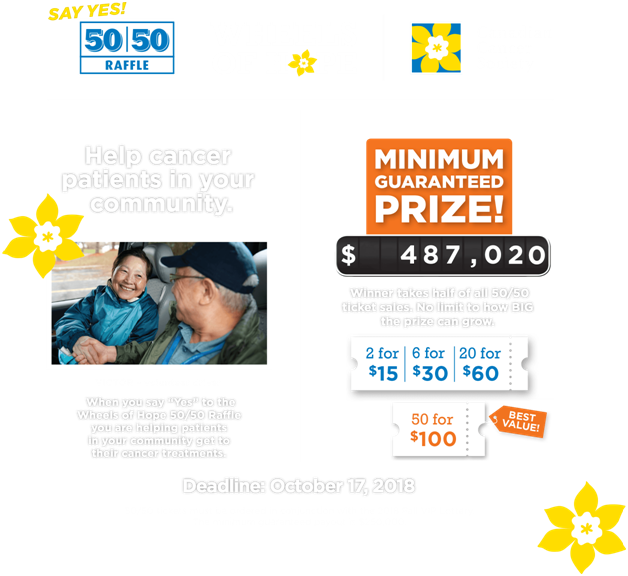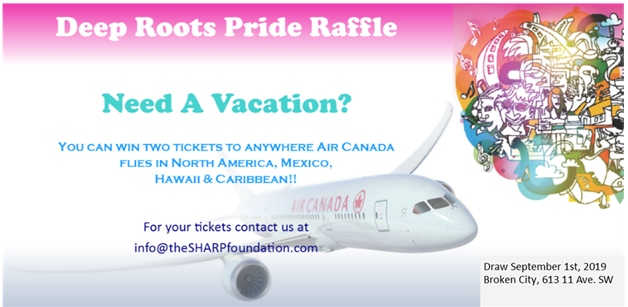What Is a Raffle and How to Run One in Canada?

Have you ever played a Raffle game? Raffle is a type of lottery in which people obtain numbered tickets, and each ticket having the chance of winning a prize. Then at a set time, the winners are drawn at random from a container holding a copy of every number. The drawn tickets are checked against a collection of prizes with numbers attached to them, and the holder of the ticket wins the prize. The raffle is usually played to raise funds for a specific charity or event.
Raffle in Canada

Canada allows charitable organizations, and only charitable organizations, to hold raffles as fundraisers, and the details vary by province.
Raffle laws are handled by three different groups: the Criminal Code of Canada, the Competition Bureau Canada, and local municipalities.
The raffle laws in each Canadian province
Ontario
Depending on the size of the prizes to be awarded, charitable organizations in Ontario need to apply for either a municipal or a provincial license, according to the Alcohol and Gaming Commission of Ontario (AGCO). Businesses must prove eligibility; to qualify, they must be a charitable organization that has been in business for at least a year and which has a location in Ontario.
British Columbia
Raffles in British Columbia are regulated by the Gaming Policy and Enforcement Branch (GPEB) of the province’s government. To be eligible, you must have a not-for-profit or community organization that is raising funds to benefit the community. You must apply for a license in advance.
Quebec: Three types of organizations can run raffles in Quebec: those donating the money to charity, people who are operating a fair or exhibition, and vendors at a fair or exhibition with a concession license. Get more details from Canada Ticket Printing.
Alberta
Raffles in Alberta are managed by the Alberta Gaming & Liquor Commission (AGLC). Non-profit and community organizations must first prove they are eligible, and then they must apply for a license before running a raffle.
Nova Scotia
Charities, religious organizations, and non-profit community organizations can legally run raffles in Nova Scotia if they apply for a license in advance. See the Nova Scotia Alcohol and Gaming Division website to apply or to get more information.
Saskatchewan
Before you run a raffle in Saskatchewan, you need to submit documentation to the Saskatchewan Liquor and Gaming Authority (SLGA). You’ll need to prove that your organization is an eligible non-profit and provide some information about the raffle. Your license fees will depend on the size of the raffle you are running.
Newfoundland and Labrador
Several types of groups can run raffles in Newfoundland and Labrador, according to the Newfoundland and Labrador government website. Examples include nonprofit fire departments, church groups, colleges, scout groups, and more. A specific person in each organization must apply for a license in advance.

Manitoba
The Liquor, Gaming, and Cannabis Authority of Manitoba allows charitable and religious organizations to run raffles; they also allow one-off raffles for certain social occasions. All raffles must be licensed in advance.
Prince Edward Island
Prince Edward Island has very specific requirements about who can run raffles. For example, only non-profit and charitable organizations can apply, and the funds raised by the raffle must be used for specific causes. You can read more about them on the PEI government website.
New Brunswick
In New Brunswick, legal lotteries may be held only by charitable organizations, and the money raised by the raffle must be used for a charitable object or purpose. If the value of the prizes to be raffled off is less than $500, you can apply for a simple permit. Otherwise, you’ll need to get a license in advance. See the New Brunswick Government website for more information.
Therefore before you think of holding a raffle in Canada you need to do a bit of research on the province and municipality where the raffle is to take place, and make sure to adhere to the rules that are set in place there. In the Province of Ontario, the amount of money to be awarded in prizes determines whether the raffle requires a municipal licence or a provincial licence. If you have any questions about whether your raffle is legal or whether you have gone through all of the necessary steps, it’s always wise to consult a lawyer who is knowledgeable in the subject. Making a mistake can be a costly, and even criminal, offence.
Popularity of Raffles in Canada
Raffles are one of the most common ways Canadians take part in gambling and support charities. They’re widely accepted across the country and are easy to join, thanks to both in-person ticket sales and the rise of online raffles.
- In 2018, over half of Canadians (55%) said they had bought a raffle ticket. That’s more than those who played the lottery (48%) or other gambling games.
- Large charity raffles known as mega-raffles (earning over $1 million) have become very well known. Examples include:
- Princess Margaret Hospital Lottery
- Canadian Cancer Society Lottery
- In 2011, Canadians spent over $750 million on charity lottery tickets. There were 16,962 charity raffles licensed that year, and that only includes the bigger raffles that need provincial licenses. The real number is likely much higher.
- The popular 50/50 raffle format, especially seen at sports events, often leads to huge jackpots. In cities like Winnipeg and Edmonton, prizes have gone over $300,000, and even into the millions during major events.
- Raffles are often part of community and sports events, and online ticket sales make it easier for people to join from anywhere within the same province.
Raffles play a significant role in fundraising for Canadian charities. About 44% of non-religious charities across the country use raffles and similar games as a source of funding.
Among those, 69% report that the revenue generated from these gaming activities is vital for supporting their operations and services.
Public perception has also shifted over time, with more Canadians now viewing raffles as a credible and effective way to contribute to charitable causes. They appreciate the dual benefit — supporting important work while having a chance to win a prize.
On average, approximately 27% of the money raised from ticket sales goes directly to charity programs, while the rest is used to cover expenses like prizes, advertising, and operational costs.
How to Run a Raffle in Canada?
Running a raffle in Canada is a regulated process, primarily reserved for registered charities and nonprofit organizations. The rules and licensing requirements vary by province, but the following steps outline the general process and key considerations:
1. Eligibility
- Only registered charities, nonprofit organizations, and certain community groups (e.g., religious organizations, amateur sports groups, fire departments) are permitted to run raffles in Canada.
- The organization must typically be in operation for at least one year (e.g., in Ontario) before applying for a license.
2. Licensing and Legal Compliance
- A raffle license is mandatory in every province, regardless of the size or format of the raffle.
- The licensing authority depends on the province and the total prize value:
- Ontario: The Alcohol and Gaming Commission of Ontario (AGCO) licenses raffles with prizes over $50,000; municipalities handle those with prizes $50,000 or less.
- British Columbia: The Gaming Policy and Enforcement Branch (GPEB) oversees all raffles.
- Quebec: The Régie des alcools, des courses et des jeux (RACJ) is responsible.
- Other provinces: Each has its own regulatory body and application process.
- For raffles with lower prize values, a simplified application may be available (e.g., in PEI, a one-page form for prizes under $5,000).
- Electronic or online raffles require additional approvals and must use a licensed Electronic Raffle System (ERS).
3. Application Process
- Submit the required application form with details about your organization, raffle type, ticket pricing, prize values, and intended use of proceeds.
- Applications may require supporting documents such as proof of nonprofit status, financial statements, and a description of how funds will be used.
- Processing times and fees vary by province and prize value.
4. Raffle Planning and Execution
- Choose a raffle format (e.g., 50/50 draw, stub draw, calendar draw, elimination draw, etc.).
- Set clear rules, including ticket prices, draw date, prize description, and eligibility (must be 18+ to purchase tickets; 19+ if alcohol is a prize).
- Book a venue if hosting an in-person event and ensure it meets any local requirements.
- Promote the raffle using approved channels; note that running a raffle on Facebook or social media without a license is illegal in Canada.
- Keep detailed records of ticket sales, expenses, and prize distribution for regulatory reporting.
5. After the Raffle
- Conduct the draw in a transparent manner, often in public or via live stream for online raffles.
- Announce and notify winners, distribute prizes, and publicly share how much was raised and how funds will be used.
- Submit a final report to the licensing authority as required, detailing proceeds, expenses, and prize distribution.
6. Penalties for Non-Compliance
- Failure to obtain a license or follow provincial rules can result in fines, suspension or revocation of the raffle license, and possible legal action.
| Step | Details |
|---|---|
| Eligibility | Must be a registered charity or nonprofit |
| Licensing | Apply to provincial/municipal authority; license required for all raffles |
| Application | Submit forms, supporting documents, and pay fees |
| Raffle Planning | Select format, set rules, book venue, promote legally |
| Execution | Sell tickets, conduct draw, keep records |
| Post-Raffle | Notify winners, report results, submit final report to authorities |
| Compliance | Strictly follow provincial regulations or face penalties |
Why You Can’t Run Raffles on Social Media in Canada?
Running raffles on platforms like Facebook, Instagram, Twitter, or TikTok is not allowed in Canada. That’s because there are strict rules to make sure raffles are fair, safe, and used for the right reasons.
1. You Need a Proper License
In Canada, you must get a license from your province or territory to run a raffle. These licenses are usually only given to registered charities or non-profit groups.
You can’t sell raffle tickets directly on social media. Tickets have to be sold either in person or through approved online systems. Social media platforms like Facebook or Instagram are not approved places to sell tickets.
2. To Keep People Safe
Licensing helps protect people from scams. It makes sure the raffle is fair, the winners are chosen properly, and the money really goes to the cause it was meant for.
If someone runs a raffle on social media without a license, there’s no one checking to make sure everything is done honestly.
3. It Breaks the Law
Canada’s laws say only licensed groups can run raffles. Raffles on social media don’t follow these laws, so they’re considered illegal gambling.
4. It Comes with Risks
If you run or join a raffle on social media, there’s a high chance it could be a scam. There might be no real prize, or the money might not go to charity. Also, if something goes wrong, there’s usually no way to fix it.
The person running the raffle could even get fined or charged for breaking the law.
Real-World Examples of Successful Raffles in Canada
Canada has a long history of highly successful raffles, particularly in the charitable sector. These raffles, often referred to as “mega-raffles,” regularly generate millions in revenue for hospitals, health organizations, and community causes. Below are notable examples illustrating the scale, impact, and diversity of successful raffles across the country.
Major Charity Lotteries and Raffles
- Princess Margaret Hospital Lottery (Ontario):
- One of the most recognized and successful hospital lotteries in Canada, routinely generating multi-million dollar revenues to support cancer research and patient care.
- Canadian Cancer Society Lottery:
- Another household name, this lottery has raised significant funds for cancer research and support programs. In 2010, the organization spent $26.7 million on fundraising and brought in $29.5 million, resulting in a $2.8 million profit for the charity.
- STARS Lottery (Alberta):
- The air ambulance service in Alberta runs one of the most efficient charity lotteries, retaining 54% of ticket sales for its operations. The lottery is a crucial source of funding for STARS, and in 2016, a last-minute ticket push led to nearly $2 million in sales in just three days, allowing the lottery to sell out.
- SickKids Foundation Lottery (Ontario):
- This lottery supports Toronto’s Hospital for Sick Children and is among the top fundraisers in the country.
- Dream Home Lotteries (Various):
- Organizations such as Big Brothers Big Sisters of Edmonton and the Red Deer Regional Health Foundation run annual Dream Home Lotteries, offering grand prizes like luxury homes valued at over $1 million. For example, the 2019 Dream Home Lottery for BBBS Edmonton featured two grand prize packages worth $1.3 million each.
- Mighty Millions Lottery (Stollery Children’s Hospital Foundation, Alberta):
- In 2018, this lottery sold out for the second consecutive year, netting over $2 million in proceeds. The 2019 grand prize was a $2.4 million show home.
Popular 50/50 and Event-Based Raffles
- Edmonton Oilers Community Foundation 50/50 Draws:
- The EOCF operates 50/50 draws during Edmonton Oilers home games, which have become extremely popular and often generate six-figure jackpots for both winners and the foundation.
- Calgary Stampede Lotteries:
- These lotteries are a staple of the annual Calgary Stampede, offering a variety of prizes and raising substantial funds for local charities.
Finally remember playing raffle has it own set of rules to follow. Because it depends on the raffle type as well as the organizers who bring the raffle.
